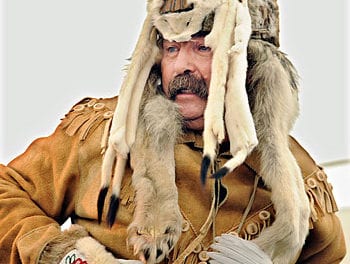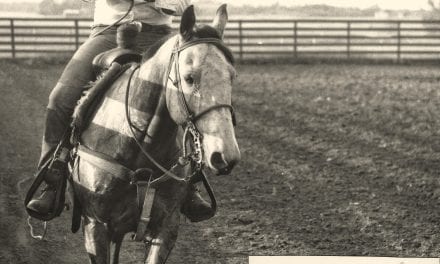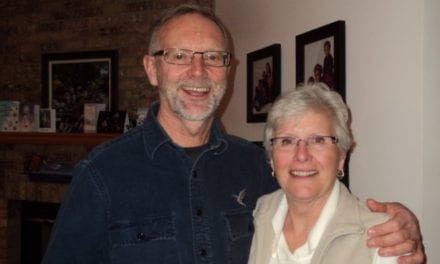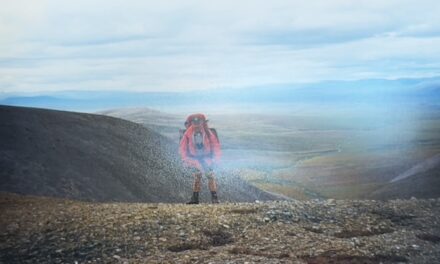I remember the Centennial Climb…. Parks Centennial. We went into the McConnell Range on the eastern side of Banff. Well north of Scotch Creek, so sort of on the northeast boundary of Banff Park. We had the opportunity to climb several peaks for the first time, so some first ascents in there. I actually have a photograph of the people that were on that trip. Some of them were good mountaineers, some of them were good horsemen and some of them were both. It was a great trip. It was another one of those situations where people from a bunch of different parks were able to get together and pull off …. a pack string of about 20 horses and 20 riders and climb some first ascents, five or maybe six, I can’t remember right now. There’s a paper somewhere …. I have it. I think Clair wrote it actually, after the climb. It was really, really well done. I’m glad that he did that. I always thought I should do something along those lines but I never did. I did make some notes, but I’ve never put it to pen. (The Parks Canada Centennial Commemorative Climbing Camp story by Clair Israelson is posted on the Park Warden Service Alumni website https://parkwardenalumni.com).
SH: Retirement … you can do it.
Darro: Laughs. I don’t know how I ever worked.
SH: Is there anything about the Warden Service, as you knew it, that you would want future generations to know?
Darro: That’s a tough one. I would say that certainly right up until the late ‘80s and I can’t speak for into the ‘90s, but up until the ‘80’s it was a sought-after job to be in the Warden Service. I recall, when the call went out for applications there would be hundreds and hundreds of applications. I think that was a testament, not just to the ideals of national parks, looking after the land and safety of the people that would come to them, but also the opportunity to work in an environment that up until the ‘90s didn’t have a lot of the technological advances that you see in many other professions. That can be very attractive to a lot of people. Even when I tell my grandsons that their father used to ride on the front of the saddle with me and we’d be out for 17 days in the bush with no TV, no screens and no telephones and you could just listen to the Rocky Mountain House country and western (radio) station, they just can’t grasp what that means. It would be a shame if that was all lost. I don’t mean lost that it doesn’t happen anymore, and it doesn’t, but people have forgotten that’s how national parks were protected and looked after up until certainly, up until the ‘90s. I think the legacy of the Warden Service up until the ‘90s anyhow, is not only for some of the individuals that partook in it, but Canadians can be kind of proud about.
I think the other thing that would be a shame if it got lost was there was the Warden Service, and we speak about the Warden Service we speak about park wardens, but there’s a whole raft of other parts of the organization that supported the Warden Service. Whether it was support staff or trail crews, or carpenters, plumbers, electricians, people that worked at the ranch. There was all this other stuff that went on behind the scenes that supported the Warden Service doing their jobs. A lot of those people weren’t referred to as park wardens, but I always thought it was part of the Warden Service. It would be a shame if that got lost, and I would include certainly up to the ‘90s again, I keep saying that, but that’s my time, my reference points. The spouses of people in the Warden Service, the role that they played, especially when we manned stations and manned the backcountry. Certainly, in Jasper anyhow, we still had families living out in the backcountry in the ‘60s.
SH: Do you have any lasting memories as a Warden? Favorite park, cabin, horse, trail, humourous stories, etc.
Darro: I think I’ve told all the stories I need to tell. I certainly have some favourite spots … some physical locations in parks that are dear to me. Takakkaw Falls is one in my early days, Bryant Creek in Banff was one of the first backcountry cabins that I spent time at. In Jasper Isaac Creek used to be one of my favourite places in the backcountry there, as well as Little Heaven on the north boundary. Those are physical places but I often, even when I was in Australia, when I found myself in the outback or in a wilderness situation similar, even in the spot I have north of Kamloops …. there’s nobody around and there’s days that it’s more of a sense than a physical location that takes me back to the days in the Warden Service.
SH: Good answer. Do you ever miss being a Warden?
Darro: Oh ya, I think I mentioned earlier that in 1992 I made a very, very hard decision and that was to leave the Warden Service and I don’t think I regret it because my life wouldn’t have taken the direction that it has since then, but it was a hard decision to make to leave the Warden Service. At that time, I thought maybe I could make a difference if I moved onto a different part of the organization.
SH: That’s when you became Superintendent of Kootenay right?
Darro: Yes
SH: And Darro just for the record here you were Superintendent of Kootenay and then list what you did after that.
Darro: I was the Superintendent of Kootenay, and then when they made the field units, I was the Superintendent of Yoho, Kootenay and Lake Louise.
SH: Do you want to talk about that decision? Was it a money thing or …. I don’t mean to put you on the spot.
Darro: I don’t know exactly what was behind the actual decision to do that but there were some vacancies at the time in the Superintendent area and there were a lot of redundancies in terms of management that seemed to make some sense. The geographic locations were a challenge and probably continue to be a challenge. Historically there were some people who were probably bothered by it. I started my career in Yoho and I had some misgivings or feelings about it, but I think that … I don’t know how it is working out now, but we had some growing pains when I was there when that happened, and I chose to move on.
I had always said I was going to leave the Public Service before I turned fifty. So I had an opportunity to leave Parks and go work with DFO (Department of Fisheries and Oceans) in Kamloops for two years before my fiftieth birthday and I owned property north of there. So it was an easy decision for me, especially when I was asked to go create an office and hire people and for the last four years in Parks, it seemed like all I did was get rid of people. People were getting laid off, and changes were happening that resulted in people being laid off. It was a good move for me, mentally anyways.
SH: So after your work with DFO in Kamloops, then you went to Australia?
Darro: Yes, I left the Public Service on my 50th birthday, which was 2002, actually the day before July 3rd was my last day in the Public Service, and then I had the opportunity to move to Australia. I couldn’t work for the first year because they wouldn’t give me a work permit. We were just there for the year. Donna had a one year contract working part time for the Canadian government and part time for the Australian government. Then they extended her contract for a year and they gave me a work permit. So, I hung my shingle out and cast around looking for some consulting work, and I ended up getting a job for the ACT government, which is the Australian Capital Territory. I had a contract with them at the EPA, the Environment Protection Agency to look at forestry practices in a water catchment. They wanted a quick overview, so I did that and just before I was finished that contract the Executive Director of Environment at the ACT called me and she was the boss of the individual who had hired me for the contract. She happened to have gone to the University of Calgary for her Masters and then her Doctorate. She knew (Steve) Herraro and a bunch of other people that I knew. We just chatted and I couldn’t figure out where this discussion was going. She dropped a bombshell and offered me the head of Environment Protection Agency job.
In Australia they have a program called Long Service Leave, after you’ve worked ten years in an organization you can get six months off with pay. So the person that hired me to do the contract was going on Long Service Leave. So she offered me the job for six months, so I said sure. It was independent, she was my functional boss, but she’s not who I reported to. I reported directly to the Chief Minister of the ACT because it’s a separate agency. That was an exciting time I really enjoyed it. We did some great work with the water utility company. Water is a big deal in Australia and water quality and quantity is on top of the agenda. Partway through that six months, Liz the person who was on Long Service Leave, phoned to tell me she was quitting and not coming back to work so she thought she’d give me a heads up and she was going to call the Executive Director, which she did. Then they offered me the job full time. I said ‘no’, I didn’t want to work full time because they wouldn’t give me time off to come back here during the summer. They’d give me four or five weeks that wasn’t enough time. I said if they’d give me eight weeks I’d do it, but they wouldn’t do that. So they said, “Will you stick around until we find someone?” And I said “Of course.” After sixteen months I hired the guy. I went out and ran a competition.
SH: Did you ask a horse question about horse wrecks?
Darro: (Laughs). That individual became the director of the EPA and I went back to consulting. So I had made a lot of contacts in the ACT government and the New South Wales government, and I ended up doing quite a bit of work with water utility companies. Then out of the blue I got asked if I’d like to be the Commissioner for the Environment for the ACT, which I said yes to. But it was a contract, it wasn’t a full time job. What they wanted me to do was look at the role of the commissioner. It was three days a week, what the job was traditionally. They’d only had two commissioners prior. So they made me the commissioner but I was looking at the office. I wrote a report and made a presentation to the ACT Cabinet. They adopted the recommendations and made it a full time job. It got a staff of six and they said if you’re interested in competing for the job, we’d like you to compete, but you have to quit. We can’t have you in the job as a contractor and then compete. So you have to step aside. But I said, ‘no’ I wasn’t interested in a full time job. So they said “Will you stay on until we hire somebody?” So I said “Ya I will.” So I did that for about another year. I had full time employment for about three years. Then I went back to consulting after that. Paid consulting work probably dried up and quit in 2014. I still get asked to comment on a few things once in awhile which I enjoy, but I do that for fun, not for pay.
SH: Do you have any photos of yourself as a Warden that you would like to donate to the Project, or that we may copy? Do you have any artifacts/memorabilia that you would like to donate to the Project (Whyte Museum).
Darro: Yes, okay.
SH: What year did you retire? What do you enjoy doing in retirement?
Darro: I officially left Parks Canada in April 2000.
SH: What do you enjoy doing in retirement?
Darro: It’s goddamn busy.
SH: Busy, looking at the lake.
Darro: I always wonder how did I ever do stuff when I was working full time. The last four years I’ve been a full time caregiver and that’s all over now. Well it’s changed dramatically. Since being back in Canada, I’ve enjoyed going to the cabin which is a two bedroom, 1400 square foot log cabin on a remote lake north of Kamloops which takes me back to my years in the Warden Service. I’ve owned it now for almost 30 years. I actually bought it in one of those Jasper summers that was only three weeks long and I thought I’ve got to find someplace that has got some sunshine. So, in the last four years we’ve managed to get there a little bit. I still get out on a horse trip every year except this year. This was the first year I haven’t been on a horse in probably about 57 years.
SH: That’s too bad. Maybe next year.
Darro: Ya.
SH: Is there anything I haven’t asked you that you think I should know about the Warden Service?
Darro: I can’t think of anything Sue. We’ve covered a lot of ground. (Tape 1:01:35)
SH: Do you want to add anything to the whole arming, sidearm thing?
Darro: I don’t know what’s out there. The arming was a big issue and I was asked to put together a group of people which I did, which included Doug Martin and a few other Union people, some Fisheries officers, some Conservation officers, a couple of people from Justice in BCIT. We spent a lot of time looking at options and pros and cons and did prepare a report which was sent to the Executive of Parks. I never heard anything after that. No one told me anything, nobody said good job, bad job, go away. I never heard anything even though there was an explicit promise to at least respond to the findings of the group, because it wasn’t my report, it was what came out of the group. I found that to be very disappointing. I’ve been told by a senior person that there’s much more to that story than you’re aware of and maybe someday I’ll tell you, but I’ve never pursued it. It’s all history, done and dusted now. It’s unfortunate because I think there were some options, but the stars were not aligned and there were a lot of things against it. Specifically, the minister at the time and the position that was being taken by the Union and Labour Canada. The stars just lined up to a catastrophe. I recall at one of the meetings of this group that that kind of a change would a require a change in the National Parks Act and that will never happen. Well guess what? It’s unfortunate but it’s part of that pendulum I was speaking of earlier.
SH: Is there anyone else I should talk to?
Darro: Alfie Creighton, his time in the backcountry and the time he spent with wardens who lived out there when he was a teenager. He was a patrolman but even before he started working for Parks he used to travel with Bob Barker on snowshoes in the winter. His dad was an outfitter way back when.
Ian Syme and Brad Bischoff
End Tape (1:06:33)
Interviewer: Susan Hairsine
Susan Hairsine worked for over 30 years for Parks Canada in Resource Conservation and Operations in Mt. Revelstoke/Glacier, Jasper and Banff national parks. She also worked for Public Safety in Western and Northern Region. She was also the Executive Assistant to the Chief Park Wardens of Jasper and Banff national parks. During her career she obtained funding for an oral history of Parks Canada’s avalanche personnel. Her experience working with several of the interviewees during her and their careers has been an asset to the oral history project.



